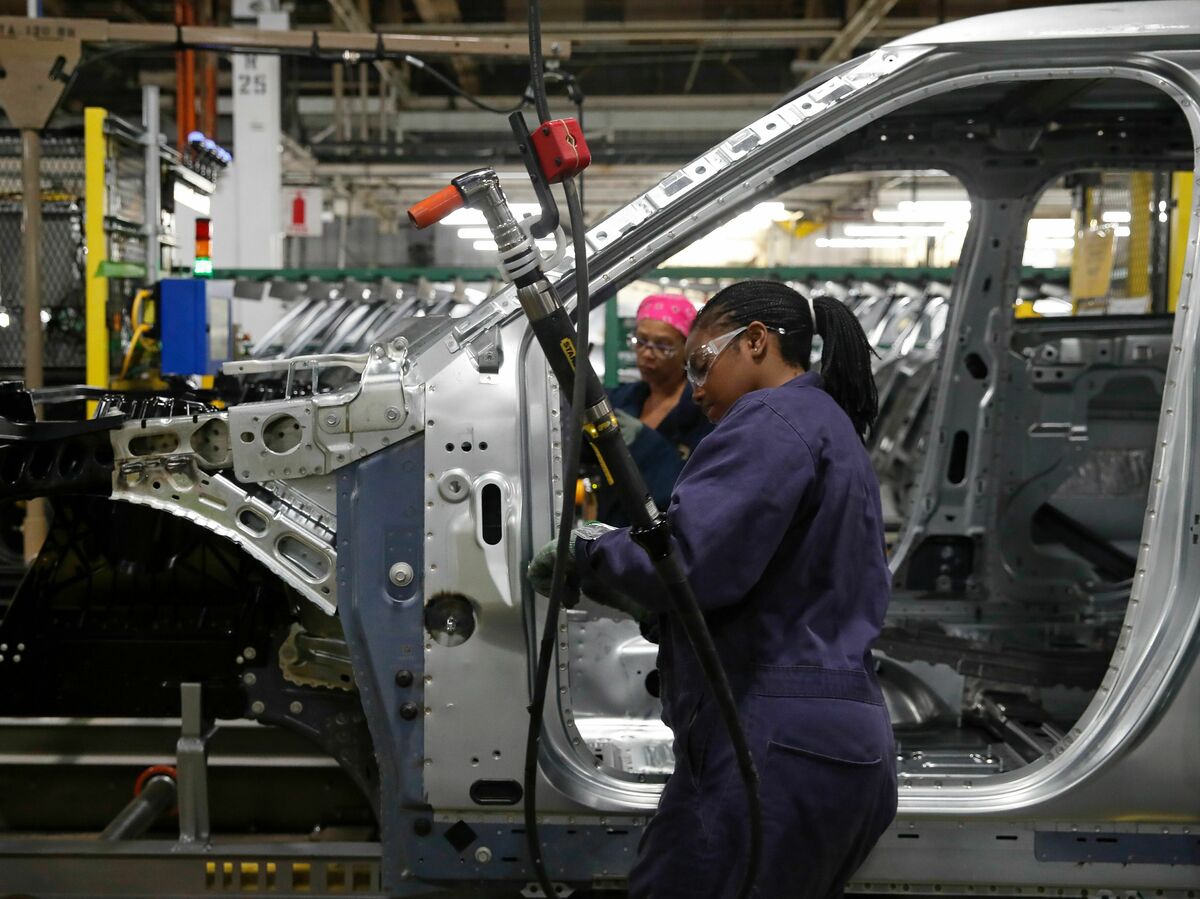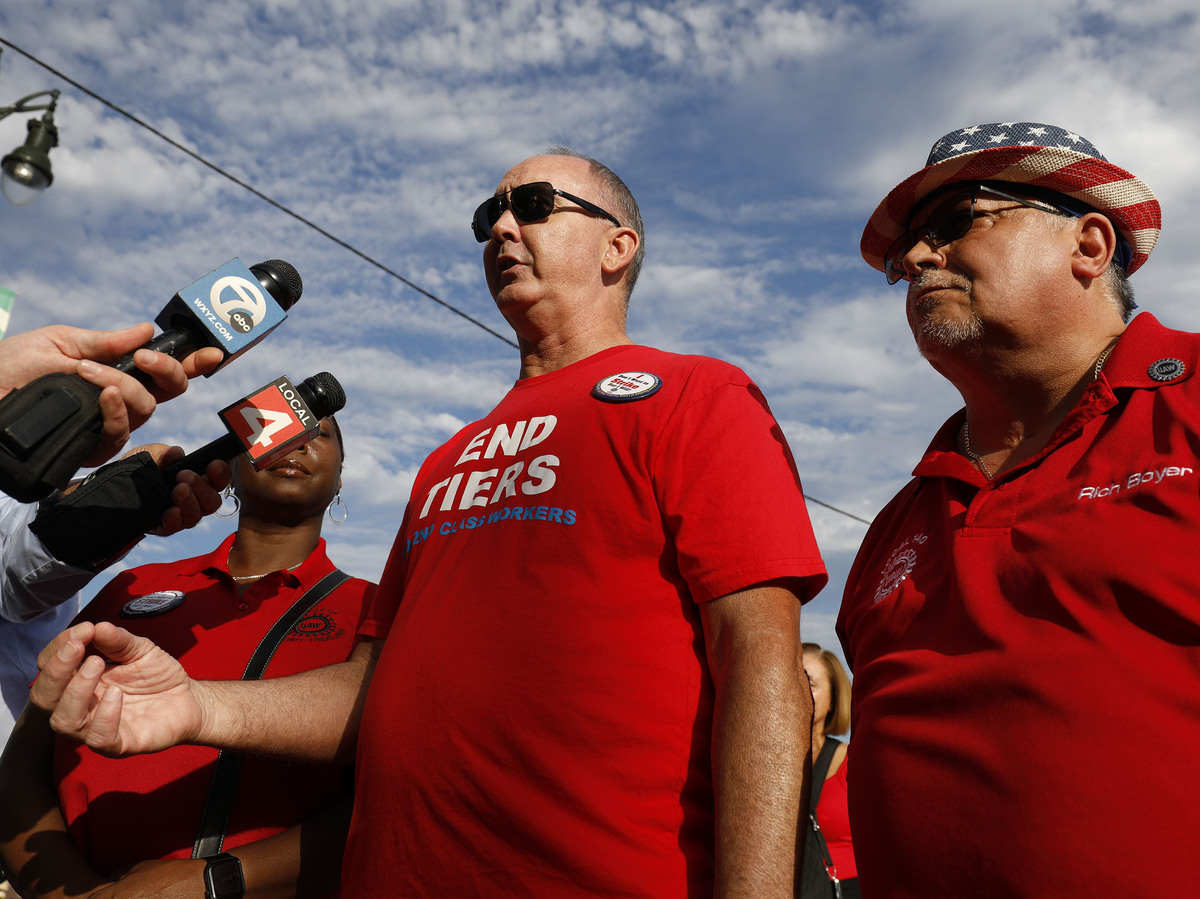
[ad_1]

Autoworkers assemble vehicles at a Ford plant in Chicago on June 24, 2019.
Jim Young/AFP through Getty Images
cover caption
toggle caption
Jim Young/AFP through Getty Images

Autoworkers assemble vehicles at a Ford plant in Chicago on June 24, 2019.
Jim Young/AFP through Getty Images
What if you happen to might work simply 4 days every week however receives a commission for 5?
That’s basically what Shawn Fain, president of the United Auto Workers, has been agitating for in ongoing labor talks in Detroit.
The reform-minded union chief envisions a 32-hour work week for 40 hours of pay, and additional time for something extra.
As wild as that may sound, he is leaning on an idea that has captured the creativeness of staff everywhere in the world, because of broadly publicized trials. Microsoft ran a month-long pilot in Japan in 2019 and reported hugely positive results, together with a 40% improve in productiveness. More not too long ago, dozens of firms within the U.S., Canada, and Europe have participated in ongoing trials which have likewise been deemed profitable.
But Fain’s push — alongside different “audacious demands” (Fain’s personal phrases) the UAW has laid on the desk — is noteworthy due to how radical a change it might characterize.
“Our members are working 60, 70, even 80 hours a week just to make ends meet,” Fain stated on a Facebook Live occasion final month. “That’s not a living. That’s barely surviving, and it needs to stop.”
The thought is steeped in UAW historical past
In truth, the concept of a shorter work week for a similar quantity of pay was championed by UAW’s leaders practically a century in the past. Fain says he found the historical past whereas perusing previous copies of UAW’s Solidarity journal from the Nineteen Thirties and 40s.
“Essentially, it was understood as a continuation of a very long-term struggle” for shorter hours and better wages, says Jonathan Cutler, a sociologist at Wesleyan University and creator of the ebook Labor’s Time: Shorter Hours, the UAW, and the Struggle for American Unionism.
Unions had fought for many years towards oppressive circumstances, with staff topping 100 hours every week. By 1938, the Fair Labor Standards Act restricted the work week to 44 hours, after which two years later to 40 hours.

United Auto Workers President Shawn Fain talks with the information media earlier than marching within the Detroit Labor Day Parade on September 4, 2023 in Detroit, Michigan.
Bill Pugliano/Getty Images
cover caption
toggle caption
Bill Pugliano/Getty Images

United Auto Workers President Shawn Fain talks with the information media earlier than marching within the Detroit Labor Day Parade on September 4, 2023 in Detroit, Michigan.
Bill Pugliano/Getty Images
At the time, Cutler says, the idea was the struggle would proceed on to the following goal, a 30-hour week.
While the concept gained traction amongst rank-and-file auto staff, the UAW management in the end stepped away from it, letting it fall to the facet in dealmaking.
“It’s a big demand,” says Cutler. “It is the axis of a lot of power struggles in labor… how much you’re going to work for the pay that you get.”
Reality on the bottom: Auto staff’ 70-hour work weeks
Few consider automakers as we speak would ever give critical consideration to what Fain has proposed. Given crops run across the clock, a shortened workweek can be costly and logistically difficult for firms already struggling to remain aggressive.
“I don’t think the company’s going to go for that,” says Jerry Coleman, a line employee within the paint division on the Stellantis Jeep plant in Toledo, Ohio.
But what a distinction it might make.
Coleman, who’s labored on the plant since 2017 as a short lived worker, says for many of that point, he is labored 10 hours a day, seven days every week — a grueling schedule that is brought on him to overlook milestones in his two daughters’ lives.
Last 12 months, he missed his youthful daughter’s kindergarten commencement as a result of he could not get the time off. This 12 months, he made the tough choice to ship his older daughter to dwell along with her mom in order that she might take part in after faculty sports activities.
“It’s not fair to her that she can’t do this, because I’m constantly stuck at work,” says Coleman.
It’s not the life he desires, however he wants the earnings.
“What can I do? Either be with my kids or lose my job,” he says.
After 5 and a half years with Stellantis, Coleman earns $19.76 an hour, plus additional time. He’s hoping the brand new contract will pace his path to changing into a everlasting worker, with higher pay and advantages and extra say over his hours.
4-day work week elsewhere proving a success
The nonprofit 4 Day Week Global, which helps firms transition away from the normal five-day work week, has discovered a whole lot of success with their trials over the previous few years.
Workers haven’t solely been happier, they’re additionally extra productive. Of the 61 firms who took half in a trial within the U.Ok. final 12 months, the overwhelming majority stated they’d proceed on with the shorter work week.
Most of the trials have concerned smaller firms with workplace staff, not line staff.
“We don’t have many manufacturing organizations in the trial as you can imagine,” says Boston College sociologist Wen Fan, a lead researcher on the trials.
Only a handful have participated, together with Pressure Drop Brewing in London, U.Ok., and Advanced RV in Willoughby, Ohio.
Fan says whereas the deadline calls for in manufacturing current an additional problem for firms, offering a further time off can have added advantages for staff, giving them relaxation from bodily taxing jobs.
“It gives people the necessary time and space to recover and refresh,” she says.
“Power concedes nothing without a demand”
Even if the shortened work week falls away from the UAW’s core calls for as seems possible, Fain does not look like letting up on his insistence for higher pay and extra day off.
“We need to get back fighting for a vision of society in which everyone earns family-sustaining wages, and everyone has enough free time to enjoy their lives and see their kids grow up and their parents grow old,” he informed supporters over Facebook Live.
Days later at a Labor Day rally, he invoked the phrases of Frederick Douglass earlier than a cheering crowd.
“Power concedes nothing without a demand,” he stated earlier than promising to take motion if a deal will not be made by September 14 when the UAW contract expires.
[adinserter block=”4″]
[ad_2]
Source link





